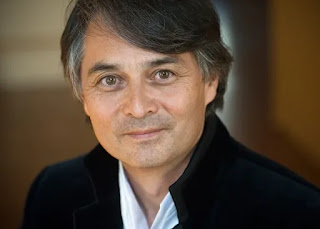'Honored and touched' by new status, Jun Märkl conducts all-Strauss program
An intermission video presented a relaxed Jun Märkl introducing himself to Indianapolis, and that was
 |
| Jun Märkl is a native of Munich, Germany, son of musician parents. |
capped by a short speech of gratitude at the start of the second half. The occasion Friday night was the historic launch of his five-year term as the eighth music director of the Indianapolis Symphony Orchestra.
It had all the hallmarks of a special occasion from the moment Märkl entered the stage at the concert's start, looking immaculately elegant in traditional white tie and tails.
The conventional garb has rarely been seen in recent years here, but there can be no doubt that Märkl will live up to that dressy standard in the likely polish and careful preparation of the ISO concerts he conducts.
The energy of the overall narrative in "Till Eulenspiegel's Merry Pranks" was palpable from the opening atmosphere setting of a "once-upon-a-time" mood. The ISO performed with a full measure of devotion to the music and the new maestro, who has been known as a guest conductor here for more than 20 years. (In his curtain speech, ISO CEO James Johnson cleared up my slightly wrong impression that Märkl first wielded the baton for the ISO in the 1990s; it was in fact in August 2020.)
"Till Eulenspiegel" may be the most popular of Strauss' tone poems, a genre he perfected before opera absorbed him. The very notion of adventure and scamp mischief bubbles to the surface repeatedly. Orchestral color, which in his "Words on Music" appearance Märkl said placed Strauss on a level with Debussy and Ravel, was richly painted throughout in Friday's performance. When Till gets his comeuppance, we are meant to take his trial and execution seriously up to a point, which was hammered down by the orchestra. But as this performance made clear, it's all part of a story in which the rascal's spirit gets the brilliant last word.
The more substantial tone poem on the program, which will be repeated at 5:30 p.m today, is "Also sprach Zarathustra," a masterpiece whose opening measures were permanently embedded in popular culture through their prominence in "'2001: A Space Odyssey."
The work goes on much past that brassy announcement with timpani highlights to represent Nietzsche's philosophical figure of Zarathustra seeking the meaning of life. It's a piece easy to get lost in, and not only in the good sense. I want to hold up, however, the brilliant soloing by concertmaster Kevin Lin. And in the lighter ensemble music, the expanded woodwind section sounded as good as the core woodwinds always do these days.
 |
| German, like the conductor: violinist Carolin Widmann |
In the middle position came a much less familiar Strauss piece, which is given its first ISO performances this weekend. The Violin Concerto in D minor was completed when the composer was just 18. It was typical of the quick start he got into the public sphere, though his precocity is probably less well-known than Mozart's and Mendelssohn's.
The opening movement spreads itself indulgently with teenage arrogance, and in Friday's concert, soloist Carolin Widmann's tone seemed to blossom against the deftly scored accompaniment only after the second cadenza-like passage. The return of the main material, including the lyrical second theme, had the requisite warmth.
The unity of soloist and orchestra was extraordinary in the slow movement. Clearly the rapport between Widmann and her countryman Märkl is first-rate. The compatibility of violin and orchestra would become transformed in Strauss' later output into those wonderful arias for soprano in the operas and the 1948 miracle of "Four Last Songs."
In the finale, so catchy in its sprightly melody, Widmann's spidery adeptness caught the right spirit, but the tone became scratchy in the frequent double-stopped passages. Some of her phrasing could have used better distribution of accents and overall shape; the illusion of her previously tight coordination with the orchestra was imperiled, though there was never a serious lapse in precision.
It was a treat, nonetheless, to hear a romantic concerto by a major composer in concert that's not overplayed. For an all-Strauss program, either this or the "Burleske" for piano and orchestra is a natural fit. In sum, then, Märkl's debut in his new role can be considered a triumph. "We're trying to create special moments here," he told the audience after intermission. "You will feel touched." Right about that.



Comments
Post a Comment